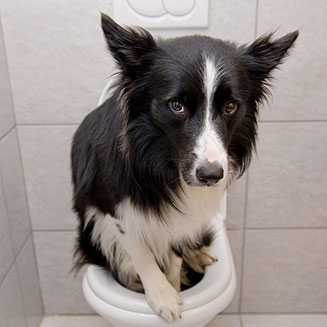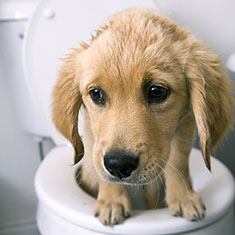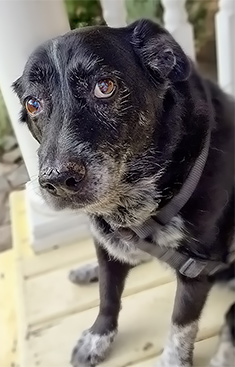Micro-Chipping Your Dog
It only takes one second for your dog to get away from you, whether through a door opened for a delivery or a gate opened by your kids when they get their bikes out of the shed. By some estimates, only 14% of lost dogs are ever returned home, primarily because no one knows where the dog lives.
Once upon a time, the only way to get your dog back was if he managed to stay in his collar and you had the foresight to attach an identification tag to the collar. Now, modern science has allowed dogs to be implanted with micro-chips which can be scanned by a vet or shelter to provide information that links the dog to you. Is this a good thing or a bad thing?

Benefits of Micro-Chipping
There's no doubt that micro-chipping provides an effective means of bringing your lost dog home. A micro-chip can also provide vital health information to the person who scans your dog, so for instance if the dog is diabetic, the vet who scans your dog will know to watch for signs that the dog needs his or her insulin before you are able to schedule a pick up.
Unlike a dog tag which may fade over time, a micro-chip is designed to last for as long as the dog does. Chip the dog once and he or she will be protected for life. Implanting the chip is relatively painless and the chip will never become lost as a collar or tag might. As compared to tattoos, a micro-chip is easier to read on a dog who has a heavy coat covering his tattoo. In addition, chip numbers are typically entered into a database that allows the chip reader to identify you. Tattoos only allow you to identify your dog.
Drawbacks of micro-chipping
The biggest drawback is that an ordinary person who finds your dog will not be able to read the micro-chip. If your dog runs away from home and makes a new friend, that person will never know if the dog has a chip or not, and in any case the person is not likely to have a chip reader handy. For this reason, micro-chip manufacturers recommend that you also use a collar identification tag as a back-up.
Various chip manufacturers use different frequencies in their micro-chips, making the chips unreadable by scanners made by other manufacturers. Sometimes the information may even be encrypted. Universal scanners are now available, but have not been purchased by all vets and shelters. Most foreign countries use an international standard frequency chip, but this has not yet been adopted by all American manufacturers. If you implant a chip in your dog, check with your local shelter to see if they can read that brand. If not, call the manufacturer and ask if they would send a free scanner to your local shelter.

If you micro-chip your dog, you must make sure to keep your information updated in the chip manufacturer's database, or the chip becomes worthless. Every time you change phone numbers, addresses, or if the medical information stored on the chip changes, you must contact the database to provide current information. This also means you have to keep track of the paperwork that comes with your micro-chip and provides the phone number or Web site you will need to visit to provide updates.
There have been persistent rumors that implants have been linked to cancer, but these reports have never been proven conclusively. There are, however, examples of micro-chips breaking free from the implantation area and causing infections or abscesses wherever they lodge.
What's the process for micro-chipping a dog?
Ask your vet for a recommendation of the type of chip that is readable by the majority of shelters and vets in your area. Once you have decided on the brand, your vet will load the micro-chip, which is about the size of a grain of rice, into a special syringe. Sticking the needle under the skin between your dog's shoulders, the vet will inject the chip. It is no more painful than receiving a vaccination, and no anesthesia is required. Depending on your dog and his or her previous experience with the vet, your dog may need to be muzzled for the procedure.
Puppies can be micro-chipped as early as 5 - 8 weeks of age. Breeders may micro-chip their puppies before sale, but the purchaser is responsible for registering the chip with the database in order for the dog to be protected.
Uncommonly, the chip may slip out of place, but the most recently manufactured chips come with a polypropylene tip that binds to the connective tissue under your dog's skin.
The chip contains a transponder that is read by a scanner emitting low frequency radio waves. The chip itself has no energy source, and there are no batteries that will need to be changed. The transponder has a small antenna that picks up the frequency of the scanner, giving it enough power to spit out the identification number of the chip, which is then displayed in the scanner's window.
The staff at the shelter or vet's office then calls the phone number associated with the manufacturer who made the chip, and give the operator the dog's identification number. The database will then display any information that has been entered, such as the dog's home address, family name, phone number, and / or any vital medical information.
Who keeps the database?
The American Kennel Club Companion Animal Recovery affiliate will enroll any micro-chipped animal for a minimal one-time fee. Individual chip manufacturers may also maintain their own registries.
The American Animal Hospital Association has created a web-based tool that assists vet offices and shelters in determining which database should be contacted when a micro-chipped dog is scanned. The free tool can be found at www.petmicrochiplookup.org.
When the dog's chip identification number is entered, the look-up tool scans the registry databases of participating organizations to see which ones contain that number, then the tool gives the vet or shelter employee the correct phone number to call to get the needed information. This allows the pet's family information to remain somewhat private, but still allows the vet or shelter to make contact with the family.
Once again, the micro-chip will only be helpful if you register it when it is implanted and remember to update your information in the database every time something changes.
Micro-Chip Identification Numbers
Even if you don't have a scanner, you may still be able to help unite a micro-chipped dog with his or her family. Many chipped dogs carry the chip ID number on their tags. If you know how to decipher the ID number, you can call the registry to get the family's information.
There are three major manufacturers of pet micro-chips in the United States. A chip with only nine characters in the ID number is made by AVID, and registry information can be found by calling 1-800-336-2843, extension 4. AVID chips may also have 10 character ID numbers, ending in the letter A.
Home Again chips may have 15 characters beginning with 985, or they may have 10 characters with the first being something other than an 0. Note that the letter O is never used in micro-chips. Anything that looks like an O is actually the number 0. Home Again can be contacted by calling 1-888-466-3242.
The AKC also markets a chip known as Trovan, which will be identified with a 10-digit number starting with three zeroes. Their registry contact number is 1-800-252-7894.
Each of the registries will be able to cross-refer you to the others if you accidentally call the wrong one.
Doggies Den: Latest Articles
 Homemade Thanksgiving Treats for Your Dog
Homemade Thanksgiving Treats for Your Dog
NUTRITION We all want to include our dogs in our holiday celebrations, but hopefully, you're aware that sharing table scraps with your dog isn't always the best idea.
 Keeping Your Dog Safe during the Summer Months
Keeping Your Dog Safe during the Summer Months
HEALTH Summer is coming on fast, so it’s time to plan how you will keep your dog safe and healthy through the lazy, carefree, warm days.
 Vaccination Time Again-Keeping Your Puppy Healthy
Vaccination Time Again-Keeping Your Puppy Healthy
DOG HEALTH So you have your new puppy picked out. There are quite a few shots, treatments and examinations that will keep the newest member of your family healthy.
 Canine Thanksgiving Feast
Canine Thanksgiving Feast
NUTRITION With the wide variety of food at Thanksgiving dinner, chances are you'll want to give your dog something special, too. If you're contemplating what to feed your dog for the holiday, here is a guide to a great Canine Thanksgiving Feast.
 Dog Walking Tips Every Owner Should Know
Dog Walking Tips Every Owner Should Know
DOG FUN Walking your dog is not only crucial to keeping him healthy and happy, it strengthens the bond between your canine friend and his caregiver. There are a lot of obstacles out there. Don’t forget these simple tips to keep your walk fun and safe in the outside world.
 The Benefits of Physiotherapy for your Dog
The Benefits of Physiotherapy for your Dog
HEALTH The same techniques that physiotherapists use to treat a variety of injuries and conditions in humans have been adapted to suit animals with great success. Family pets, show dogs, and working dogs can all benefit greatly from physiotherapy. Dogs whose activities involve a lot of agility are especially susceptible to the types of problems that physiotherapy can address.
 The Decision- Adding a Dog to Your Family
The Decision- Adding a Dog to Your Family
FIRST TIME OWNERSBringing a dog into your family is a decision where many people don’t realize it’s magnitude until after they have the dog. There are a number of things that you need to research before you decide to purchase a dog, and it starts right in your own home.
 Bringing Your Dog Into Your New Baby's Life
Bringing Your Dog Into Your New Baby's Life
HEALTH Many believe that a dog and a new baby cannot happily coexist, so therefore the dog has to go. This is not necessarily the case.  A new baby does not mean you have to abandon your dog.

Doggies Den:
Most Popular Articles

Dog Pregnancy Symptoms
HEALTHIf you suspect your dog might be pregnant, check out part one in this series on pregnant dogs, where we cover pregnant dog symptoms.

Dog Birth
HEALTHIn the third article of our dog pregnancy series, we look at the wonderful, but messy, process of bringing newborn puppies into the world.

Indoor Dog Potties
DOG PRODUCTSIt's been a long day at work. You were so busy, you didn't even take time to eat a sandwich, let alone run home to let your dog out. You're on your way home, knowing the poor dog is crossing his or her legs by now, when your car breaks down, delaying you even further. Can't somebody make this easier?

Your Dog’s Digestive System
PHYSIOLOGYEver wonder why your dog eats so fast? Or why he eats gross things? Or why he gets sick to his stomach? Or why his waste stinks so bad? Some of these things are normal, some are not.

Canine Respiratory System
BREATHINGThe basic function of your dog's respiratory system is to bring oxygen in to and remove carbon dioxide from the body. Knowing the symptoms of respiratory diseases can help you help your stay healthy.

Shelter Dog Adoption Tips for Success
ADOPTION Are you intimidated by the prospect of "rescuing" a dog from a shelter? One reason that you may be wary of adopting a dog from a shelter is not knowing how to choose. Adopting a dog from a shelter can be a rewarding process, if you're prepared to do a reasonable amount of research.

Canine Urinary Tract Infections
SYMPTOMS AND TREATMENTDoes your dog seem to be having trouble relieving his or her bladder? Learn how to recognize the signs of urinary tract infections and how to treat them before they spread.

What to do for Dog Diarrhea
SYMPTOMS AND REMEDIESIf you have dogs in your house for any length of time, you have likely experienced at least one bout of dog diarrhea. Beyond the pain in the tuckus involved in cleaning up the mess, you should know what causes diarrhea, and when it's important to see the vet.

What to do for a Dog Bite
DOG BEHAVIOR Getting bitten by a dog can be scary, and you may be tempted to run around in circles for a while, trying to figure out what to do. Here's our guide to help you manage the situation.

Top Ten Tips for Living with a Senior Dog
DOG HEALTH Bringing home a new puppy is so exciting, but it doesn’t take all that long for your exuberant puppy to grow into a senior dog who may have special needs. Here are the doggies.com top ten tips for taking care of your companion who has been with you through so much.
